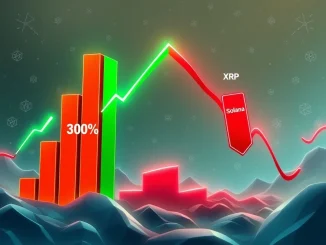
The financial world is watching South Korea as the value of the **Korean won** takes a significant dip. For those navigating the often-volatile landscape of the **South Korea crypto market**, understanding broader economic shifts like currency fluctuations is key. This recent development could have ripple effects worth noting.
Why the Korean Won is Facing Pressure
On May 7, the **Korean won** opened trading at 1,380 per U.S. dollar, marking its weakest point in six months. This represented a notable drop of 25.3 won from the previous day’s close, as reported by Yonhap.
Several factors contribute to currency movements. While specific drivers for this particular dip can be complex, general influences on the **won dollar exchange rate** often include:
- Global Dollar Strength: The U.S. dollar often strengthens during times of global economic uncertainty or when U.S. interest rates are high relative to other countries.
- South Korea Economy Factors: Performance of key export industries, inflation rates, and domestic economic policies all play a role.
- Geopolitical Events: Regional or global tensions can impact investor sentiment and capital flows.
- Foreign Investor Sentiment: Changes in how foreign investors view the prospects of the **South Korea economy** can lead to inflows or outflows of capital, affecting the won’s value.
Understanding the USD Korean Won Dynamic
The relationship between the **USD Korean won** is a critical indicator for trade, investment, and economic stability in South Korea. When the won weakens against the dollar, it means it takes more won to buy the same amount of dollars. This has practical consequences:
- Imports become more expensive: Goods and raw materials priced in dollars cost more for South Korean businesses and consumers.
- Exports can become cheaper: South Korean products sold internationally become more competitive on price, potentially boosting export volumes.
- Inflationary pressure: Higher import costs can contribute to rising prices within South Korea.
- Capital flows: A weakening currency can sometimes signal investor concerns, potentially leading to capital leaving the country, further pressuring the won.
Looking at the historical **won dollar exchange rate** can provide context. While 1,380 represents a six-month low, the won has traded at weaker levels in the past, particularly during periods of significant global economic stress. However, reaching this point again highlights current pressures on the currency.
Potential Implications for the South Korea Crypto Market
How does a falling **Korean won** connect with digital assets? South Korea is a major hub for cryptocurrency trading, with significant volume often seen in won-denominated pairs, particularly for Bitcoin and Ethereum.
Here are a few potential links to consider:
- Trading Volume Shifts: Currency instability could potentially influence trading behavior on South Korean exchanges. Some domestic investors might view crypto as an alternative asset during times of fiat currency weakness, while others might be less inclined to invest new capital.
- Fiat On-Ramps/Off-Ramps: The exchange rate directly impacts the cost of converting won into cryptocurrencies and vice-versa for international traders.
- Investor Sentiment: Broad economic indicators like currency strength can influence overall investor confidence, which can spill over into risk assets like cryptocurrencies. A struggling **South Korea economy** might temper enthusiasm, while a search for alternatives could boost it.
- Regulatory Environment: While not a direct consequence of the exchange rate, economic conditions can sometimes influence regulatory approaches to financial markets, including crypto.
It’s important to note that the relationship is complex and not always direct. The global crypto market is influenced by numerous factors, and the **Korean won**’s performance is just one piece of the puzzle, albeit an important one for the local market.
What This Means for Crypto Holders
For those with exposure to the **South Korea crypto market**, or simply following global economic trends, the won’s decline is a data point to monitor. It underscores the interconnectedness of traditional finance and the crypto space.
While there’s no simple prediction, understanding the pressures on the **won dollar exchange rate** can offer insights into the economic backdrop against which South Korean crypto investors are operating. Diversification and staying informed remain key strategies in volatile markets.
In Conclusion: Monitoring the Won’s Path
The recent drop of the **Korean won** to a six-month low against the U.S. dollar is a significant event for the **South Korea economy**. Driven by a mix of global and domestic factors, this currency movement has implications that extend beyond traditional finance, potentially influencing dynamics within the prominent **South Korea crypto market**. As the situation unfolds, market participants will be watching closely to see if the won stabilizes or faces further pressure, and how this might ultimately affect investor behavior in the digital asset space.



